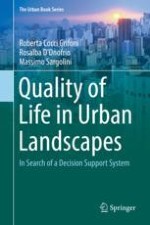2018 | OriginalPaper | Chapter
3. Use of Decision-Support Systems in Defining Scenarios for Sustainable, Shared Urban Development
Authors : Roberta Cocci Grifoni, Rosalba D’Onofrio, Massimo Sargolini
Published in: Quality of Life in Urban Landscapes
Publisher: Springer International Publishing
Activate our intelligent search to find suitable subject content or patents.
Select sections of text to find matching patents with Artificial Intelligence. powered by
Select sections of text to find additional relevant content using AI-assisted search. powered by
